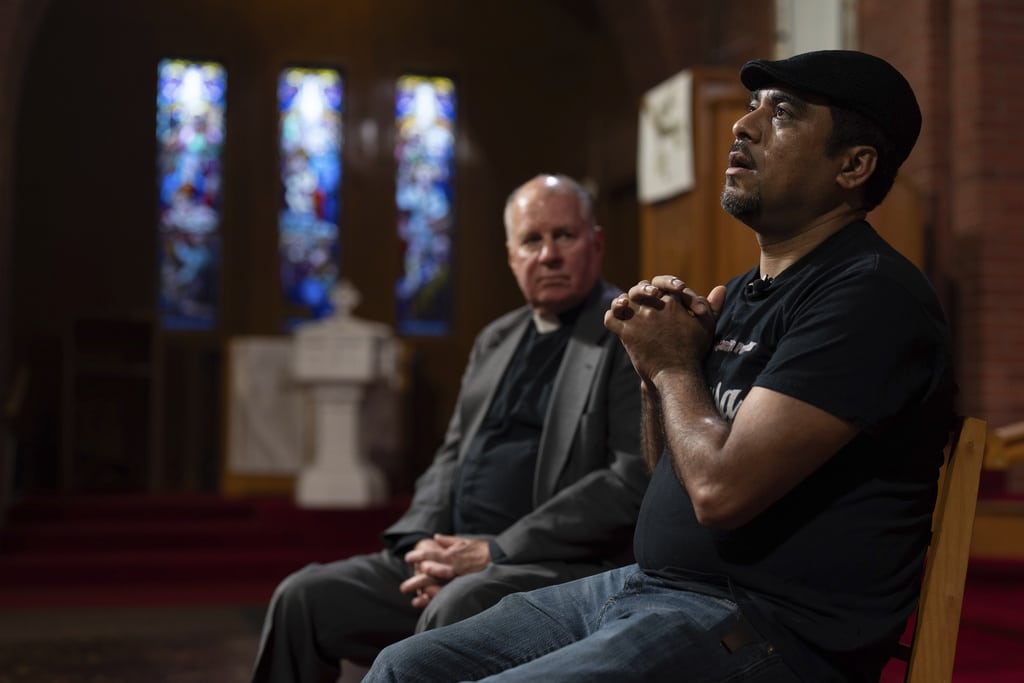In each of his three presidential campaigns, Donald J. Trump has emphasized the threats that he believes illegal immigrants pose. In his second term, he has announced plans for even greater enforcement of laws authorizing the deportation of such individuals.
Churches, some of which once housed fugitive slaves, have long served as sanctuaries for individuals seeking asylum or resisting conscription during the Vietnam War (Chappell 2025).
Under the Joe Biden Administration, Alejandro Mayorkas, the Secretary of the Department of Homeland Security, updated prior policies that limited enforcement actions in or near “sensitive locations,” which included places of worship. He specifically required prior written supervisory approval or exigent circumstances.
Trump Administration OKs immigration enforcement in churches
On the day of Trump’s second inauguration, Benjamine Huffman, then acting director of DHS, rescinded the Mayorkas Memorandum. He said that DHS would no longer impose “bright line rules regarding where our immigration laws are permitted to be enforced.” He did, however, direct officers to use “discretion along with a healthy dose of common sense” when carrying out their enforcement responsibilities.
Sixteen denominational bodies and another 11 denominational and interdenominational associations, all in the Judeo-Christian tradition, which stress the importance of welcoming and serving immigrants, brought a suit in the U.S. District Court for the District of Columbia seeking an injunction against the new policy. They based their case on the First Amendment, the Religious Freedom Restoration Act, and the Administrative Procedure Act. At least one of the plaintiff churches reported a DHS action since the policy rescission, two reported actions on non-plaintiff churches campuses, and four reported DHS surveillance near their premises.
Federal judge declines to block ICE policy about entering churches
On April 11, 2025, Judge Dabney L. Friedrich declined to issue the injunction, although her decision suggested circumstances under which she might have intervened. She observed that preliminary injunctions are considered to be an extraordinary remedy. Prior cases had established that courts should only issue such injunctions in cases that established “likely success on the merits, likely irreparable harm in the absence of preliminary relief, a balance of the equities in its favor, and accord with this public interest.”
Moreover, to establish requisite standing, plaintiffs bringing suit on behalf of their members were required to establish an “injury in fact”; a “‘causal connection between the injury’ and the challenged action”; and the likelihood that the court could provide “favorable redress.”
Plaintiffs asserted four injuries. They were as follows:
- “associational injury based on the imminent risk that immigration enforcement actions will be taken at member congregations”;
- “organizational injury based on concrete declines in attendance at worship services and social service ministries”;
- a “conscience injury,” which would force them to choose “between welcoming all immigrants consistent with their religious obligations or restricting in-person services to protect immigrants from law enforcement”; and
- an “organizational injury based on the costs of increased security measures.”
Judge: Churches had not shown 'credible threat' of enforcement
In addressing the first issue, Judge Friedrich denied that the plaintiffs had shown “a ‘credible threat’ of enforcement.” She noted that DHS had not directed its agents to target churches or to single them out, and the plaintiffs had only pointed to isolated instances of any DHS activity near their facilities.
In addressing church attendance declines, which some churches had documented, Friedrich noted that the plaintiffs had not established that these declines were related to the specific policy revision under attack rather than to Trump’s more general enforcement policies and the publicity that they had received. She noted reports of immigrants during Trump’s second term who also refused to leave their houses for nonchurch-related activities. The judge further argued that the plaintiffs had not demonstrated “that a preliminary injunction would redress their alleged attendance injury.”
In examining the conscience injury, the judge observed that “absent a credible threat of enforcement, the causal link between religious welcome and an immigration raid at a place of worship is ‘simply too speculative or too attenuated to support Article III standing.”
The judge also dismissed concerns over the cost of increased security measures by observing, in accord with an earlier judicial decision, that “a plaintiff ‘cannot manufacture standing by incurring costs in anticipation of non-imminent harm.’”
Judge's decision is narrow, could have had different outcome
Although the decision disappointed religious groups and groups advocating immigrant rights, the decision itself is fairly narrow. It suggests that the judge might have arrived at a different outcome had the plaintiffs been able to establish that the DHS was specifically targeting or singling out churches and their congregants for special treatment or that their actions were having a more substantial impact on their ministries. Moreover, in February, U.S. District Judge Theodore Chang in Maryland had blocked immigration enforcement operations at Quaker worship sites pending a decision in a lawsuit they had brought.
In the meantime, primary attention has focused on administration efforts to deport individuals, like Mahmoud Khalil for exercising First Amendment rights of speech, press, and association while residing in the U.S.
John Vile is a political science professor and dean of the Honors College at Middle Tennessee State University.

